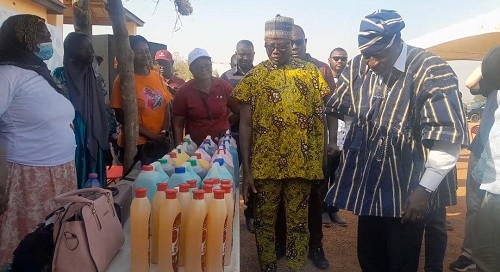
World Bank Vice-President hails impactful SOCO project - Calls it game changer
The Vice-President of the World Bank, West and Central Africa, Ousmane Diagana, has hailed the spiralling impact of the Gulf of Guinea Northern Regions Social Cohesion Project (SOCO) on the lives of people, especially those in poor rural communities in northern Ghana.
“SOCO”, he noted, “is a game changer”, and gave assurance of expediting action for the release of funds to continue the project and also increase the beneficiary communities.
Mr Diagana made the observation when he led a delegation made up of the World Bank Ghana Country Director, Robert Taliercio O’Brien; the Director for Local Governance and Decentralisation, Samuel Seth Passah, and representatives from the USAID, the UNDP and the UNHCR, to inspect some of the projects under the SOCO in the Northern Region.
The World Bank is the sponsor of the US$450 million SOCO project that is being rolled out in four countries, namely Ghana, Togo, Benin and Côte d'Ivoire.
Livestock Market
Mr Diagana, who appears to be a practical person, became more convinced about the impact of SOCO-initiated projects in beneficiary communities when he and his team got to the grounds and inspected the Nangbag-Yapala Livestock Market in the Sagnarigu Municipal Assembly that had opened up the local economy and boosted economic activities for small-scale business operators.
The livestock market, which has a modern kraal facility and is complete with a holding bay, loading ramp, toilets and offices for a veterinary officer, revenue collector and chief butcher, serves as an economic hub, fostering vibrant commerce and creating livelihood opportunities for the community.
Farmers, who sell their cattle at the Livestock Market, which started operations on November 3, 2024, make an income of about GH¢400,000 each market day on Sundays, according to data released by the Ministry of Local Government, Decentralisation and Rural Development. Income from the sale of small ruminants each market day is also estimated at GH¢100,000.
During the site visit, Mr Diagana also inspected other livelihood activities, including the production of smock by the Daboya Smock Weavers Association and the Shishagu Soap Makers’ Group, a group of 13 women and two men who have become a symbol of hope for the community.
The investments made in these groups, according to the SOCO project implementers, had brought about social cohesion by bringing the people together.
“I am very satisfied. I have seen concrete activities that have been funded by the project. I am very impressed to see that there is a community at large that is a beneficiary of the project – that is the essence of the project.
They consider it their project – so there is this sense of community ownership, which is critical,” he noted.
“I also understand that this is a need that was expressed by the community themselves. So, it means that we have been responsive to their needs.
This is what this type of project is supposed to do.
Of course, given the magnitude of the need, it will be very important to put to good use what exists already – to have very good communication about what the project activities are so that the partners will be more encouraged to do more,” he added.
Following the impactful stories, the beneficiary communities are sharing, the demand to extend the project to non-beneficiary communities keeps increasing. This places a huge responsibility on the project-funding sponsor and its partners.
In response, Mr Diagana said the numerous requests for the extension of the project to non-beneficiary communities were a sign of the successes of the SOCO project and gave an assurance that the World Bank would continue to support the project to achieve desired results.
He was also optimistic that governments in the four beneficiary countries, Ghana, Togo, Benin and La Cote d’Ivoire, would also do their part to ensure the sustainability of the project.
The World Bank, Ghana Country Director, Robert Taliercio O’Brien, with some of the beneficiary MMDAs, said feedback from them was very useful to the bank to understand their need to see how the projects were structured to achieve desired results.
Achievements
The Director for Local Governance and Decentralisation, Samuel Seth Passah, speaking on behalf of the Chief Director at the engagement with project stakeholders, revealed the interest the SOCO project had attracted among the government and other development partners of the country.
He highlighted some of the progress made so far. “Within two years of the project’s effectiveness date, we have begun to see its impact on the ground across 48 districts, 217 clusters, covering 1,700 communities, representing a population of 1.5 million. The project has also disbursed US$60 million, which is 40 per cent out of the total US$150 million in the last two years,” he noted.
Minority groupings
The Coordinator of the SOCO project, Elizabeth Ohenewah Agyei, said one challenging issue her outfit had had to battle with was how to get the minority groups in the community to participate in the project.
Nevertheless, she said continuous engagement with the minority groupings was yielding positive results, further solidifying the sustainability of the project in the beneficiary communities.
She noted that the project development goals had been achieved within two years of its implementation, anchoring her response on the impact of the project on the lives of the people.
“Going forward, we should see how others who are looking forward to being beneficiaries are attended to.
One of the things that we also look forward to is being very specific to be able to measure the changes that are occurring.
This is because if you are not able to measure the impact that these projects are making, then we won’t be able to know where exactly and how the next step will be,” she explained.
